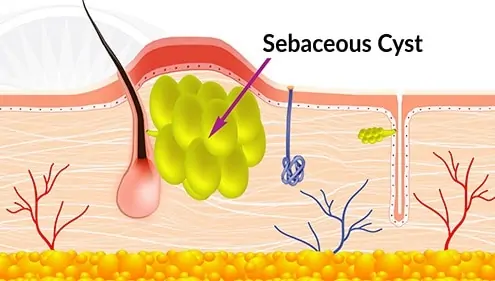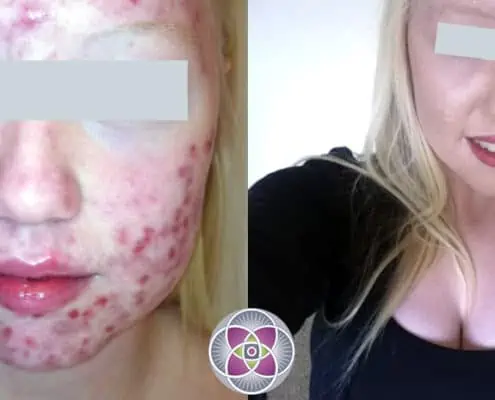

Before we dive into the science behind hormonal acne, let’s briefly touch on genetics. Is acne genetic?
Given that almost everybody suffers from some degree of acne, our genetic endowment is almost irrelevant. We have treated many teenage patients whose parents did or did not have it, and whose siblings did or did not, and vice versa. Even patients who happened to be identical twins living in the same home and eating the same food had completely different experience with acne. So in the case of your genetics and chances of getting acne, your parents are off the blame hook.
As far as hormonal acne and whether or not birth control can help control these types of acne outbreaks, that is a much more detailed story as you will discover below.
As mentioned earlier, acne (common and cystic) shows up typically in the teenage years, as androgen (sex) hormones begin transforming our bodies. Thus the evidence is clear that androgens are strongly associated with acne.
However, given that all people go through the teenage years, why do only some get acne?

Many studies have concluded that there is nothing remarkably different in the hormone levels of an teenager who gets acne verses one who does not. Furthermore, the hormone levels of teenage boys and girls are vastly different, and yet both sexes are equally at risk of getting acne.
Bottom line: We simply don’t know what it is about a particular teenager’s physiology that reacts to the new presence of sex hormones by causing acne.
In the case of women, young and adult, the presence of too much testosterone is directly correlated with acne. Other signs of excessive testosterone might also be present, such as growing hair typical of men, such as facial hair etc. In such cases it is important to investigate and identify the cause of the extra testosterone, such as in the case of Polycystic Ovarian Syndrome (PCOS), wherein cysts on a woman’s ovaries produce testosterone. With a positive diagnosis, medications that block testosterone can be helpful in reducing and even eliminating the acne.
A woman in her early 40’s suddenly started getting severe acne, as bad as when she had it as a teenager. The cause was excessive testosterone which she was inadvertently absorbing “second hand” from skin-to-skin contact with her new boyfriend who was using prescribed testosterone cream.
As is always the case, ideally the underlying cause of a condition, such as acne, should be identified and directly treated rather than just the symptoms caused by the condition.
Accordingly, rather than blocking testosterone, it would be better to actually heal the underlying cause for the production of the extra testosterone. In this regard, in addition to your conventional MD turn also to your Naturopathic Doctor (ND) and Doctor of Oriental Medicine (DOM) for acupuncture and herbal remedies. In our experience, these alternative therapies can be as effective at reducing the production of extra testosterone as western drugs are at blocking testosterone, with the added advantage that they do not cause the negative side effects that virtually all pharmaceutical drugs do.
Unlike prescription drugs that are exactly the same no matter which pharmacy you buy it from, the quality of the treatments you will receive from a ND or DOM is highly dependent on how experienced and skilled that particular practitioner is. It is worth the time and effort to get a referral to one that has had extensive experience in treating the malady you have.

Some women develop acne breakouts routinely the week before their period. A brief explanation of the physiological mechanism that causes period acne will help you understand how to deal with it.
Right after ovulation, in preparation for becoming pregnant, a woman’s body secretes high levels of progesterone. Progesterone is an essential driver behind preparing the uterus for the arrival of a fertilized egg. Under the influence of progesterone the epithelial lining of the uterus thickens, blood flow increases, and secretions in the uterus thicken and become more mucus like. All this in order to make the walls of the uterus the perfect sticky nourishing environment for the arriving fertilized egg to implant and develop.
The reason this causes acne during your period is because progesterone stimulates a similar response in all epithelial linings where ever they are found in the body, not just the lining of the uterus. Increased blood flow and thickened secretions happen all over.
Vaginal secretions, saliva and even tear fluid thicken, and of course, the oil secreted by the epithelium of sebaceous glands in your skin (sebum) also thickens, to the extent that your pores can become plugged-up resulting in acne approximately one week before your period. Thickened mucus happens at ovulation for many women.
In explaining this to women patients present in my office for consultations, some of them have “lit up” and exclaimed that they can actually “feel” their body’s response to progesterone and can even “show me how”. Apparently the saliva of some women thickens to the point they are able to blow bubbles off their tongue, and have done so in my office to everyone’s delight.
Preventing hormonal acne during your period is simple. Once per month, right when you predictably develop your monthly acne, exfoliate the upper dead layers of your skin, which opens the plugged pores and allows the oil (Sebum) to freely flow.
You can achieve this on your own with a good sonic exfoliated brush, or you can pamper yourself with a medical grade facial. The very best method is an epithelial peel combined with Salicylic acid infusion, which breaks up and liquefies thickened sebum.

Have you ever considered throwing a lit match into a room filled with super dry sawdust? The entire room can erupt into flame with almost explosive ferocity.
Throwing a hormone into your physiology is not that different. Sometimes hormone therapy or using birth control to prevent hormonal acne is exactly the right thing to do, and under the careful management of an expert, hormone therapy can be a huge benefit to your health and wellbeing.
However, it is critically important for every person considering using birth control to prevent hormonal acne to know that almost every cell in your body will feel it. Even minuscule amounts of hormones affect virtually every system in your body down to the level of every single cell. Keep this in mind when considering using birth control to treat acne. Is it worth the risk? Can you achieve what you want in a healthy way without hormones?
The reason birth control pills are used to prevent hormonal acne, is because the hormones that these pills contain trick the body into thinking that you are pregnant, thereby shutting down the monthly fluctuations of various hormones that cause your period and secondarily your acne. For many, using birth control for acne has proven effective in controlling outbreaks.
However, remember that the extra hormones that you have artificially introduced into your physiology will affect virtually all your other organ systems and may cause serious unwanted side effects, from weight gain to increased risk of stroke, heart disease and cancer.
Remember, like a lit match in a saw dust factory, hormones are not to be trifled with. If you chose the birth control route in order to control your acne, be sure to engage a qualified physician expert in these issues who will monitor your health and wellbeing.
Doctors Alice Pien, MD and Asher Milgrom, Phd are established pioneers in the fields of Regenerative Medicine and Skincare. Their expertise ranges from advanced laser systems to HCT/P – Stem Cell medicine. Their medical education and advanced certifications span from medical schools of NY State University, the University of Chicago, to Johns Hopkins, Harvard and UCLA. They approach medicine with the clinical expertise of over 85,000 successful treatments over the past 20 years and significant scientific research resulting in proprietary protocols that they customize for each individual patient.
AMA Regenerative Medicine & Skincare | 1570 Brookhollow Dr., Santa Ana, CA 92705 | 6310 San Vicente Blvd STE 285, Los Angeles, CA, 90048 | Privacy Policy